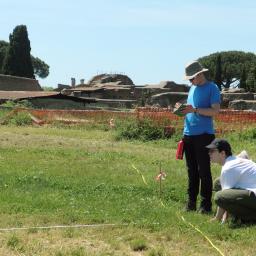If we fail to make the transition to a circular economy, economic growth and prosperity will end within the next fifty years. The Centre for Sustainability is working on this transition, with research and teaching ranging from the molecular level to future scenarios.
Arnold Tukker is Professor of Industrial Ecology at Leiden University and director of research of the Leiden-Delft-Erasmus Centre for Sustainability. He gave his inaugural lecture in February. The message: the world’s population has grown exponentially since the 1950s, and with this both demand for raw materials and emissions have risen exponentially. And now, at the beginning of the 21st century, we already find ourselves in a situation where we must find radical technological and social solutions in the coming forty years.
THE CIRCULAR ECONOMY
The Centre for Sustainability – which addresses issues from molecular reactions to long-term societal prospects – wants to contribute to these radical solutions, with research, teaching and by working with other parties. The aim: the transition from a linear to a circular economy, in which biotic and abiotic raw materials are not used up or discarded, but continue to circulate in cycles and are constantly re-used.
This is the only way to maintain a certain degree of economic growth and increase prosperity, while also allowing rising economies in Asia and Africa the standard of living that we now enjoy.
FEWER LEAKS IN THE CYCLE
Tukker: ‘Although we will never be a perpetual motion machine, we can ensure that there are as few leaks as possible in the cycles of raw materials and products. And there is a great deal more to it than just recycling. Everything is interconnected, and for a real transition, not only do all the cogs in the economy need to be linked, but we also need “re-thinking” at every level on issues such as ownership, consumption, production, waste processing, R&D and revenue models.’
LEIDEN-DELFT-ERASMUS
All these aspects and lines of approach are being tackled by just as many disciplines. This means that they, too, need to work together, develop new disciplinary visions and, at the very least, know what other disciplines are doing. This would seem straightforward; after all, if scientists are not working together, how can we expect the whole world to do so? Practice often proves otherwise, however, and that is why, in Tukker’s view, it is so important that the three universities in Leiden, Delft and Rotterdam tackle this challenge together.
Tukker: ‘Fundamental science, technology and product design, research on business models and governance models, models for calculating the life-cycle of products: we need all these scientific fields, and we also have them all in-house and have been collaborating in sub-fields for some time. Only if this takes place more broadly and intensively will we be able to take responsibility for the transition to the circular economy. It’s no accident that the Dutch National Research Agenda is currently preparing a text on the “Circular economy” route, in which an integration of disciplines like this is a key aim.’
You can read the text of Arnold Tukker’s inaugural lecture here: ‘Moving forward in circles: The circular economy as a recipe for sustainability.’
You can also read Leiden University’s inspiring interview with Professor Tukker: ‘Circular economy essential to keeping the economy running.’
ADVICE FOR THE EU: HOW CAN EUROPE CLOSE THE CIRCLE?
The transition to a circular economy is being taken very seriously by Europe, and an action plan was established in 2015. But how can Europe use the mishmash of existing policy instruments – where one hand often doesn’t know what the other is doing – more efficiently, so that there are fewer leaks in the cycles? And how can the EU encourage, motivate, facilitate and regulate member states, entrepreneurs and consumers in such a way that gives the transition to a circular economy – which has long been underway from the bottom up – a significant push?
The Netherlands holds the EU Presidency this year. Commissioned by the Ministry of Infrastructure and the Environment, the Centre for Sustainability published advice for the European Commission, having first investigated both European product chains and European policy on circularity. What policies are already in place and what instruments exist? Is there sufficient coherence and are there gaps? The researchers looked at the product chains and associated leaks for four product groups: electrical and electronic appliances, synthetic textiles, the construction industry and wood. The resulting advice includes both straightforward measures and more visionary recommendations for the long term.

SOME OF THE RECOMMENDATIONS FOR EUROPE:
- Much policy already exists, but it is too fragmentary: it should be integrated through the whole production chain.
- Investing in product life is at least as important as investing in waste processing.
- Existing policy is too top-down: encourage technological experiments and bottom-up dynamics. Ensure that creative pioneers get opportunities for development and scaling-up.
- Facilitate consumer choice with a crystal-clear product labelling system.
- In order to prioritise efficiently, make use of research into the life cycles of products.
- Tax raw materials, not labour.
Read the advisory report and the underlying research by the Centre for Sustainability: ‘Towards a circular products initiative in the EU’
For those interested in finding out more, also see the European action plan ‘Closing the loop – An EU action plan for the Circular Economy’
EUROPEAN RESEARCH ON THE CIRCULAR ECONOMY
There is also a strong focus on the circular economy in the European research agenda, with million-euro subsidies for international consortia of academics, businesses and other parties.
In May, an international consortium network of universities, businesses and other organisations, led by the Leiden-Delft-Erasmus Centre for Sustainability, won a European subsidy for research on the circular economy. The subsidy has been granted for the so-called Marie Curie Innovative Training Network (ITN). Fifteen doctoral students will analyse the transition to a circular economy from a wide range of perspectives and disciplines. The Institute of Environmental Studies at Leiden University and TU Delft’s Faculty of Industrial Design Engineering are playing a key role in the new network, together with the fifteen doctoral students. The network is led by Arnold Tukker, professor of Industrial Ecology at Leiden University.
Read more
The Centre for Sustainability is also participating in another large European consortium, the Knowledge and Innovation Community (KIC) ‘Raw Materials’ at the European Institute of Innovation and Technology (EIT). Tukker: ‘The Marie Curie programme that has now been secured offers excellent synergy with the Raw Materials KIC, where activities addressing circularity are also just starting.’
Also read our earlier message.


